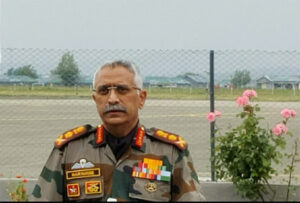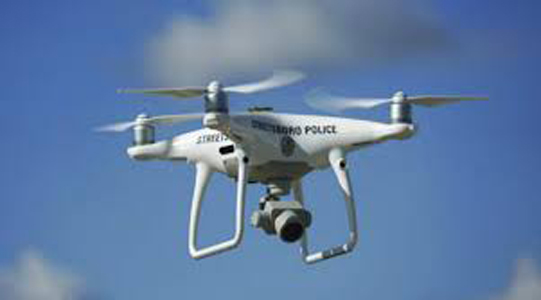NEW DELHI, JULY 1
Army Chief Gen MM Naravane on Thursday said that easy availability of drones has increased the complexity of security challenges from both state and state-sponsored actors and called for shedding “old mindsets” to deal with the changing character of modern warfare encompassing a multitude of new threats.

Speaking at a think-tank, he said the transition of the military to the digital age is “contrarian” to the defence procurement procedure and that the first and foremost issue was changing the existing mindset to embrace change.
The Army Chief”s comments came days after explosives-laden drones were used to carry out an attack on the Jammu Air Force station in the first such instance of suspected Pakistan-based terrorists deploying unmanned aerial vehicles to strike at vital installations in India.
Gen Naravane said that there was a need for shedding old mindsets and make procedures “more flexible” and “adaptive” to bring in changes and incorporate niche technologies like artificial technologies to deal with emerging challenges and prepare for future wars.
“All this would require simplified procedures that facilitate the transition. Unfortunately, this has been one of our biggest stumbling blocks. The transition to digital age is contrarian to DPP (Defence Procurement Procedure) and DPM (Defence Procurement Manual) mindsets.
“In order to harness niche technologies like AI, exploit our depth in IT and realise the vision of Atmanirbhar Bharat (self-reliant India), we need to shed old mindsets and make our procedures more flexible and adaptive,” he said.
Gen Naravane said the urgency to embrace the change will come only with the realisation and understanding of the changed character of modern warfare and that the leadership needs to fully comprehend the nuances of new technologies.
The Army Chief also referred to noted military historian B H Liddell Hart’s famous quote: “The only thing harder than getting a new idea into the military mind is to get an old one out.”
Referring to new-age security challenges, he said building drones became like a “Do It Yourself (DYI) project that could be tackled at home.”
“The easy availability of drones definitely raises the complexity and challenges that we have to deal with. We are seized of the problem and we have put in place certain measures,” Gen Naravane said at the virtual conference organised by Global Counter Terrorism Council.
He said that troops on the ground were sensitised about the evolving threat and that capabilities are being developed to deal with the challenges from both states and state-sponsored actors.
Referring to artificial intelligence (AI), Gen Naravane said it is becoming a critical part of modern warfare.
He said based on the recommendations of the National Task Force on artificial intelligence, the Army has streamlined the implementation of its AI-driven plans and schemes.
“Much work is underway in this direction to operationalise the capability in different terrains, at varying altitudes and over extended ranges,” he said.
Gen Naravane also said that a data governance policy to streamline the flow of data for usage in various AI applications and creation of a Centre of Excellence for AI in Mhow along with an AI lab are some other initiatives already undertaken by the Army.
“Artificial Intelligence, is today the modern, holy grail of technology, with far reaching implications on the nature of geopolitics and geo-strategics. By way of impact and influence, it will exceed the Industrial Revolution by several orders of magnitude,” he said.
The Army Chief said AI systems would be the enablers for the forces to operate in the future multi-domain operations where AI-infused autonomous weapon systems would become force multipliers in future wars and be the fulcrum around which big data will be turned into actionable intelligence.
At the same time, he also talked about exercising some caution.
“The induction of modern technologies would also need to be seen in the context of our active borders, the peculiarities of the Line of Control and the Line of Actual Control, and the mandate to ensure territorial integrity,” he said.
“While greater integration of Artificial Intelligence, and better computing power, will undoubtedly augment human effort and also free up resources, there are areas where this would not work or have negligible impact,” he added.
The Army Chief said that since World War II, high-tech militaries have been thwarted consistently by low-tech opponents.
“Thus, there is a need to maintain a balance while infusing technology into our inventory and doctrines,” he added.












